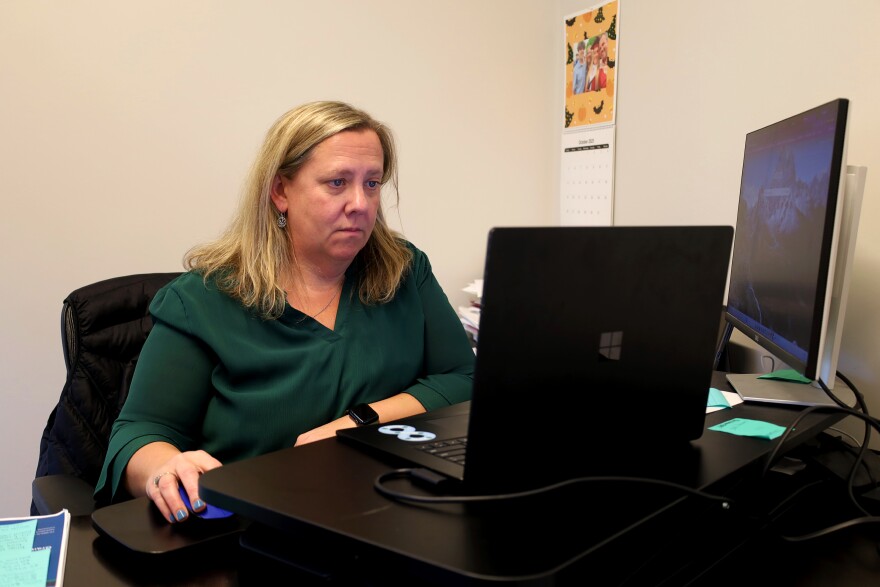The U.S. Department of Housing and Urban Development is moving away from funding long-term housing, threatening the stability of hundreds of formerly homeless people in Louisville and Kentucky.
The shift in priorities under President Donald Trump was laid out in the Notice of Funding Opportunity issued by HUD earlier this month. It lays out how the administration plans to award nearly $4 billion in Continuum of Care grants.
For decades, the federal government has given preference to long-term housing programs, so organizations have adapted to offer that. Now, the Trump administration is telling local agencies that funding for those programs can only make up 30% of their overall ask.
Catherine McGeeney, communications director for the Coalition for the Homeless in Louisville, said this is a significant change that will leave many programs in financial limbo.
McGeeney said that out of about 1,600 people in Louisville currently in a long-term housing program, about 1,000 are at risk of ending up back on the streets due to the changes. It also narrows the options for unhoused people, she said.
“We have already cut off referrals for permanent supportive housing in Louisville, because there isn't guaranteed funding for projects into next year,” McGeeney said. “What that means is that for people who are unsheltered or in shelters, who are seeking housing solutions, their already-limited options are going to dwindle more.”
Statewide, the 30% cap could eliminate rental assistance for 2,610 formerly homeless Kentuckians with disabilities, according to the Kentucky Housing Corporation.
The long-term housing programs at risk include permanent supportive housing, a model that combines rental assistance with access to services such as case management, transportation to doctor’s visits and mental health counseling. These programs typically serve people with physical or mental disabilities.
Instead, the Trump administration wants the majority of federal funding to go toward transitional housing programs that try to help people exit homelessness quickly — usually within one year — by providing substance use treatment, mental health services and job training.
While that might work for some, McGeeney said many people currently in permanent supportive housing may struggle.
“Transitional housing is very effective as an intervention among certain groups who don't need long-term support, but not as effective among people with disabilities who do need support,” she said.
HUD will also give priority to programs that require getting treatment for substance abuse or mental health as a precondition to housing.
The shift is ideological as much as it is monetary.
HUD under the Trump administration is adopting the view of conservative critics of popular housing policy: that short-term programs with a focus on self-sufficiency and sobriety are the key to lasting stability for people experiencing homelessness.
Housing service providers, meanwhile, argue these cuts to permanent housing will lead to many people falling through the cracks.
Local programs under threat
The funding changes come as the number of people sleeping on the streets is increasing.
In Louisville, the 2025 point-in-time count identified 633 people who were not living in housing or temporary shelter, up from 595 the year before. Nearly 1,300 people across the Commonwealth were on the streets during that time period, according to the Kentucky Housing Corporation, representing a 25% increase year-over-year.
Volunteers of America Mid-States, which operates in Kentucky, Tennessee, West Virginia and Southern Indiana, has multiple programs that are at risk under the new funding guidelines.
At their VOA Home campus in Louisville’s Shelby Park neighborhood, the agency operates Unity House, a temporary shelter and rapid rehousing program for families. The program helps families experiencing homelessness transition quickly from shelter into housing.
About 25 families live in individual rooms at the shelter. Some are small, with enough space for a bunk bed, while others have multiple bunk beds and twin-sized mattresses.

Families eat dinner together in a cafeteria and the kids have a study room, where a Jefferson County Public Schools teacher offers homework help and tutoring.
When a spot becomes available in the rapid re-housing program, families leave the shelter for a place of their own. They receive financial assistance for up to a year, along with case management services.
Tamara Reif, VOA’s senior director of housing services, said the goal is stability, for families to transition to independent living, with parents working and paying their rent and utilities.
“We try to get their credit up so that they can really prepare to be able to go out on their own,” Reif said. “We're helping them with any legal issues that they may be facing … just checking in on all of those things to ensure that they are really taking care of their whole selves, so that when the time comes, they're ready to be on their own.”
HUD considers programs like this to be long-term housing. Reif said VOA could fairly easily tweak the Unity House program to classify as transitional housing, which HUD prefers.
Each program applying for HUD funding is scored based on certain criteria. Having different requirements or programming elements gives the proposal more points. That’s how HUD incentivizes programs that align with its views.
If VOA shifts its Unity House program, it could earn more points by offering extensive programming, like financial literacy classes or counseling. HUD wants programs to have 40 hours per week of these offerings, with fewer hours required for people who find a job.
Reif said their sober living spaces, called Freedom House and Liberty Place, have that level of programming.
“Certainly it would require a lot more staff, but we do have at least a model, a structure of how they are fitting in 40 hours, because that's a requirement for residential treatment,” she said.
VOA also provides case management services for people living in permanent supportive housing. That includes 75 clients who are housed through a grant that Louisville Metro manages, as well as people living at The Chancery, a 34-unit apartment complex VOA opened last month.
The case management services they provide are similar to what they offer to families that are part of the Unity House program. They check in with people on a regular basis, help them make appointments and can provide referrals to drug or mental health treatment. Funding for those services is now at risk.
If that funding goes away, Reif said VOA will be “scrambling to help them figure out what success looks like for them” and they may have to “be creative” in figuring out how to continue funding those programs.
Outside of Louisville and Lexington, the situation is more dire, said Adrienne Bush, executive director of the Homeless and Housing Coalition of Kentucky.
In rural areas, the available services for people experiencing homelessness or people at risk of becoming homeless are fewer, Bush said, and there’s little alternative funding outside of the federal dollars.
“If these cuts go through as intended, it will just wipe out programs where we do have them,” she said.
Bush noted that rural and suburban areas outside Kentucky’s two largest cities have seen the largest growth in the last year of people living on the street.
While the changes will negatively impact most service providers, these agencies have to decide whether they’ll speak out and what they’ll say.
HUD’s Notice of Funding Opportunity tells them officials may consider media reports, public complaints and their history of “subsidizing activities that conflict with the NOFO” as grounds for denying funding.
The Homeless and Housing Coalition of Kentucky is both an advocacy group and service provider, providing federally-funded rental assistance in rural areas.
Bush said she understands the fear providers have, but her organization has to push for sound housing policy regardless of who’s in the White House. She said HUD’s changes are "disappointing" and will likely result in increased homelessness.
“We know what works,” Bush said. “The challenges of the homeless service response system have not been about the program models or approaches that have been taken, it’s been a challenge of scale.”
'A monumental change’
Last year, Louisville’s housing service providers received $23 million in Continuum of Care grants, $17 million of which was for long-term housing programs. The changes adopted by HUD may cut that to $7.2, according to the Coalition, a drop of about 57%.
The national picture isn’t any different.
Long-term housing programs accounted for the vast majority of all the Continuum of Care grants received last year, according to the National Low Income Housing Coalition, which said the cuts threaten to “upend homelessness response systems” and “increase homelessness.”
There are so many longer-term programs because HUD has positioned and funded them as the solution to homelessness since the early 2000s. That was solidified by the HEARTH Act in 2009.
But some groups, like the Cicero Institute, a conservative think tank, have spent years pushing back on this approach and they’ve found a receptive ear in the Trump administration.
Devon Kurtz, the public safety policy director at the Cicero Institute, said the new Notice of Funding Priority represents “a monumental change” on par with the HEARTH Act in scale.
Kurtz said housing service providers shouldn’t be shocked by the change.
“I think we see this in the language of the executive order from back in July where there is this emphasis on pathways to self-sufficiency,” he said. “If they've been reading the room in terms of state-level policy that we've been advocating for and attitudes with even the first Trump administration, this should not be a surprise.”
The Cicero Institute provided model legislation for so-called camping bans that influenced The Safer Kentucky Act. That legislation, passed by the General Assembly in 2024, made it a Class B misdemeanor to sleep on the streets.
The Safer Kentucky Act also included a ban on state funding for Housing First programs. That approach involves practicing harm reduction, running needle exchanges or safe use initiatives, and not requiring substance use treatment as a precondition to housing.
State lawmakers said they believe Housing First programs, regardless of the evidence suggesting it’s more effective than forced treatment, are enabling drug use.
Similarly, HUD is less interested in funding Housing First programs.
“I worry about subjecting non-drug-using individuals to drug-using individuals in the same housing,” Kurtz said.
Kurtz also argued that drugs as powerfully addictive as fentanyl weren’t as prevalent when permissive policies like Housing First were popularized.
The National Alliance to End Homelessness has estimated these changes by HUD could put 170,000 people in the U.S. back out into homelessness.
Kurtz and others in his camp reject that number.
Kurtz said he is willing to concede that some people may not be able to achieve self-sufficiency in a one- or two-year program. But he thinks transitional housing could be more effective for people without severe physical or mental disabilities.
“I don't believe this administration is going to allow 170,000 disabled people to be evicted like that, I just reject that premise,” Kurtz said. “Some number of them are going to be able to move on and be self-sufficient.”
If it turns out that the number of people who need long-term housing programs is higher than the 30% HUD expects to fund, Kurtz said agencies need to communicate “honestly and cooperatively” with the federal government to adjust.







